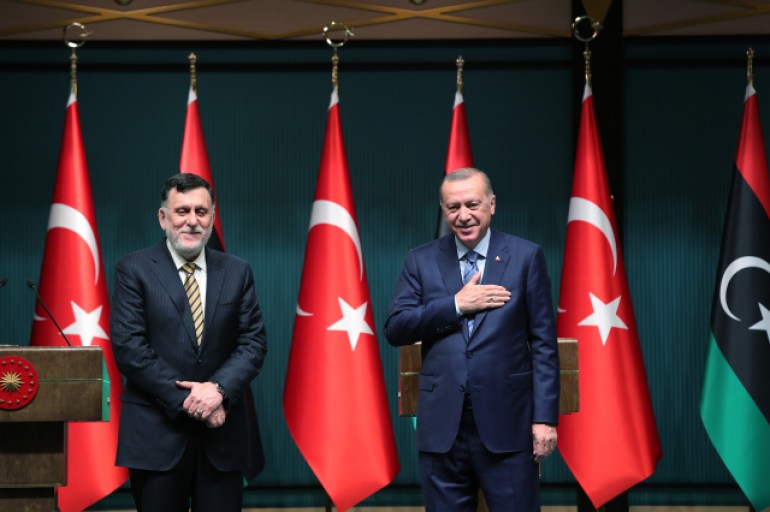The Israeli National Security Studies Institute considered that the victories achieved by the Al-Wefaq government in Libya constituted a threat to the interests of Israel, which seeks to avoid the worst in its relationship with Turkey.
A report - published by the British Middle East Eye website - dealt with the findings of the Israeli Research Institute that the recent gains made by the internationally recognized government at the expense of the forces of retired Major General Khalifa Hifter may threaten Israeli interests in the region.
The institute considered that the conflict in Libya would not directly affect Israel in the event that the Turkish-backed government of Al-Wefaq would control the reins of rule over the entire Libyan soil, but this would weaken the influence of countries that support Israel's activities in the eastern Mediterranean.
The report added that Turkey will exert great influence in the North African country, which will enable it to show off its eastern Mediterranean power and continue to challenge Israeli interests in the region, and to challenge Israel's Egyptian, Cypriot and Greek allies.
The report stated that the foreign ministers of Cyprus, Egypt, France, Greece and the UAE signed a statement condemning Turkey for its "illegal activities" in the region, while Israel did not sign that statement.
The institute says that Israel's "silence" indicates that it has not taken a clear decision about exercising any role in Libya for fear of escalating tension between it and Ankara.
Turkish influence on average
The report indicates that Israel needs to be prepared to expand Turkish and Russian influence in the region, in light of Washington's reluctance to play a more active diplomatic or military role.
Among the rare times that a clear position on the Libyan conflict has been announced, the US military command in Africa announced a few days ago that it might deploy a number of its forces in Tunisia in response to Russia sending war fighters to Libya to support Haftar.
The Israeli report makes clear that the gains achieved by the National Accord government are attributed to Turkey's military intervention, stressing that the development of events contributed to strengthening Ankara's role as an influential party in the conflict.
Turkey, with its intervention in Libya, has gained a foothold supporting its ambitions in the Mediterranean, as it started a number of gas exploration projects a while ago, according to the Israeli report.
Last year, Turkey and the Al-Wefaq government signed a Memorandum of Understanding to demarcate the borders of the eastern Mediterranean regions in an effort to cordon off Greek and Cypriot energy exploration activities in the region. Some countries, such as Greece, France and the UAE, have expressed condemnation of these projects.
Common interests
The British Middle East Eye website report shows that the Israeli suspicion of the Turkish eastern Mediterranean has not yet reached a degree that could spark a conflict between Tel Aviv and Ankara.
Earlier, an Israeli source told Middle East Eye that the governments of Israel and Turkey were looking forward to the restoration of diplomatic relations and the appointment of ambassadors.
The same source indicated that the two parties have common interests, including the supply of natural gas in the eastern Mediterranean.
Nevertheless, the report confirms that a complete breakthrough in relations is not looming, especially after the re-election of Prime Minister Benjamin Netanyahu, who does not have a good relationship with Turkish President Recep Tayyip Erdogan.

